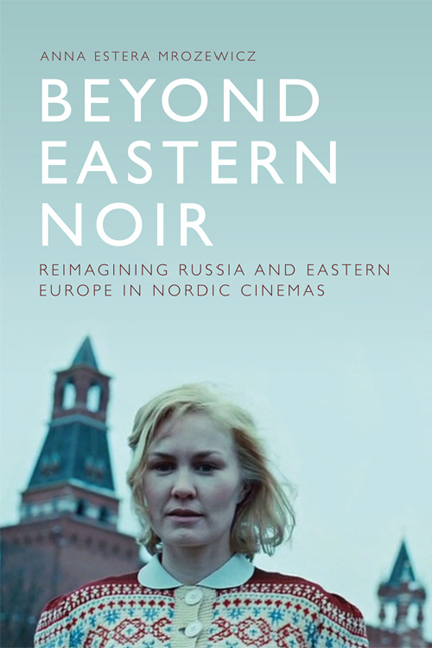Book contents
- Frontmatter
- Contents
- List of Figures
- Acknowledgements
- Introduction – The Iron Curtain Effect: Nordic Eastern Noir
- 1 Borders: Russia and Eastern Europe as a Crime Scene
- 2 Boundaries: Infiltrated Identities
- 3 The Baltic Boundary
- 4 Guilt and Shame in (Trans)national Spaces
- 5 Embodying the Fear of Russia: The Militarised Body
- 6 Polish Spectres in our House: Revisiting the Nordic Metaphor of the Home
- Afterword – Beyond Eastern Noir: Toward a New (Cinematic) Space
- Bibliography
- Filmography
- Index
4 - Guilt and Shame in (Trans)national Spaces
Published online by Cambridge University Press: 24 April 2021
- Frontmatter
- Contents
- List of Figures
- Acknowledgements
- Introduction – The Iron Curtain Effect: Nordic Eastern Noir
- 1 Borders: Russia and Eastern Europe as a Crime Scene
- 2 Boundaries: Infiltrated Identities
- 3 The Baltic Boundary
- 4 Guilt and Shame in (Trans)national Spaces
- 5 Embodying the Fear of Russia: The Militarised Body
- 6 Polish Spectres in our House: Revisiting the Nordic Metaphor of the Home
- Afterword – Beyond Eastern Noir: Toward a New (Cinematic) Space
- Bibliography
- Filmography
- Index
Summary
In the previous three chapters, the primary focus has been on the spatial adjacency of Norden and Russia/Eastern Europe, and the multifaceted imagery of both division and connection triggered by borders in Nordic films. One aspect of these spatial dialectics is economic inequality across borders. The current chapter explores films made on the eve of the 2004 enlargement of the European Union, with a focus on the extreme economic disparities among the nations bordering the Baltic Sea. This inequality is portrayed in two films that adopt the issue of sexual exploitation as a lens: Lukas Moodysson's fiction film Lilya 4-ever (Lilja 4-ever, Sweden, Denmark 2002) and Pål Hollender's documentary Buy Bye Beauty (Sweden 2001). Both films stage the Baltic as a physical, economic and moral division/connection. This chapter focuses on how these films approach this economic inequality on an emotional level – particularly through the guilt felt by the Nordic subjects. These films may be seen as counter-narratives to the freedom narratives generated across the Baltic (and analysed in Chapter 3), where the Baltic is imagined as a gateway to the northern world of freedom.
Whereas Moodysson's and Hollender's films both epitomise guilt, the last section of this chapter is devoted to shame – a feeling often conflated with guilt. Shame is as equally relevant as guilt in the context of transnational inequalities. Here, I will discuss a film which may not seem an obvious choice to draw a comparison with – Pirjo Honkasalo's documentary, The 3 Rooms of Melancholia (Melancholian 3 huonetta, Finland, Denmark, Germany, Sweden 2004). Whereas Moodysson's and Hollender's films tackle the sex trade in the Baltic Sea region, Honkasalo's documentary deals with the Russian–Chechen war. Aesthetically, these films differ substantially: Lilya 4-ever is a feature film shot in a para-documentary style with non-realistic inserts, while Buy Bye Beauty uses a shabby aesthetics mocking television documentary, and The 3 Rooms of Melancholia combines observational, reflexive and poetic documentary modes (see Nichols 2010). Nevertheless, these films share similarities insofar as they all posit the primacy of feeling in their approach to Nordic/Eastern European/Russian encounters. Such a comparison helps to illustrate how Nordic encounters involving guilt and shame with Russian and Eastern European neighbours involve two very different ways of negotiating the Nordic self in the increasingly globalised world.
- Type
- Chapter
- Information
- Beyond Eastern NoirReimagining Russia and Eastern Europe in Nordic Cinemas, pp. 119 - 142Publisher: Edinburgh University PressPrint publication year: 2018



